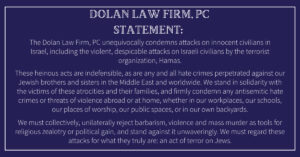
David from Albany writes: “Chris, I am strongly opposed to President Donald Trump. I’ve been highly critical of him on social media. Friends of mine have told me I need to be careful what I say, cautioning to tone down my anti-Trump comments. Can’t I express my views on the President as I see fit?”
David, yes you can. What makes America great is that, as expressed by President Abraham Lincoln, we have a government of the People, by the People, and for the People. Under the First Amendment to the Bill of Rights to the U.S. Constitution it is our right to speak out and peacefully assemble in protest to the government.
The First Amendment reads as follows: “Congress shall make no law respecting an establishment of religion, or prohibiting the free exercise thereof; or abridging the freedom of speech, or of the press; or the right of the people peaceably to assemble, and to petition the government for a redress of grievances.”
Political speech, as compared to commercial or sexually explicit speech, is given the highest protection. The U.S. Supreme Court in its landmark 1964 decision of New York Times v. Sullivan explained that fundamental to the First Amendment is “the principle that debate on public issues should be uninhibited, robust, and wide open, and that it may well include vehement, caustic, and sometimes unpleasantly sharp attacks on government and public officials.”
Keep in mind, the First Amendment, like all of our rights, is not without limits. Certain types of speech, such as child pornography nor obscenity, are so lacking of value that they do not receive protection under the First Amendment. Moreover, certain “fighting words” are not accorded protection. The classic example is the person who falsely shouts “fire” in a crowded theater. The First Amendment does not bar the individual’s prosecution for setting off a panic.
The “fighting words” exception to First Amendment protection, however, is narrow. The Supreme Court has stated, “Fighting words are not a means of exchanging views, rallying supporters, or registering a protest; they are directed against individuals to provoke violence or to inflict injury.”
For example, in the 1960’s the Supreme Court reversed the conviction of a KKK leader for advocating violence by threatening vengeance on local African Americans. Likewise, the Supreme Court reversed the conviction of a civil rights leader who organized a boycott of white-owned businesses for threatening any African-Americans that patronized the stores. In neither case was the language followed by violence.
The Supreme Court held in both cases that the constitutional guarantee of free speech encompasses rhetoric that advocates unlawful action. What would not be protected is an intentional effort to incite imminent lawless action which was likely to generate violence such as whipping up a crowd into a rage and directing them to riot.
When it comes to “fighting words” concerning the President, be aware that a specific federal law applies. Title 18, Section 871 of the U.S. Code makes it a crime to knowingly and willfully threaten to take the life of, to kidnap, or to inflict bodily harm on the President or Vice President. Section 879 of Title 18 extends the law to members of the immediate family of the President or Vice President, as well as former Presidents.
How does the law operate? First, it does not usurp the First Amendment. In Watts v. United States, the Supreme Court held that only “true” threats are grounds for a conviction under Section 871. At a Vietnam War protest, a speaker stated, “If they ever make me carry a rifle, the first man I want to get in my sights is L.B.J.” The speaker was charged with and convicted of violating Section 871. The Supreme Court reversed the conviction on the basis of the First Amendment, finding that the speaker had not made a “true ‘threat,”’ but had indulged in mere “political hyperbole.”
At the same time, many individuals have been convicted, and their sentence upheld on appeal, for violating Section 871. The standard used by the courts is whether the defendant intentionally made a threat that in the context it was made a reasonable person would foresee the statement as a serious expression of an intention to harm the President. In short, criticism of the President that departs from political discussion to intentional threats against the life or safety of the President can result in criminal prosecution.
By attorney Christopher B. Dolan, owner of the Dolan Law Firm. Email Chris questions and topics for future articles to help@dolanlawfirm.com









